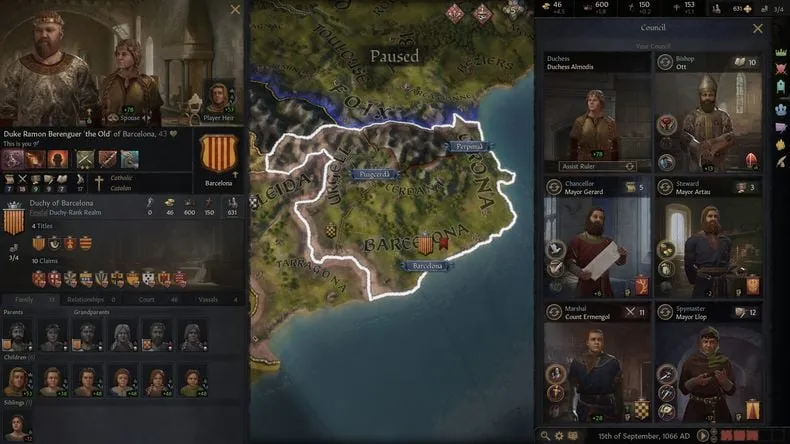Introduction
Crusader Kings III offers players a deep and complex grand strategy experience, where choices affect your dynasty for generations. While some players focus on aggressive expansion, playing tall—consolidating a small but strong kingdom—is a highly effective strategy for long-term stability. Playing tall emphasizes internal management, efficient use of resources, and careful planning to avoid rebellions and economic collapse. This guide provides step-by-step strategies to help you thrive while maintaining a small, secure realm.
Focusing on a stable, well-governed kingdom allows you to maximize your vassals’ loyalty, strengthen your economy, and maintain a strong military without overstretching your domain. From choosing the right realm to managing internal politics and infrastructure, this article covers everything you need to dominate your small kingdom over generations.
1. Choosing the Right Starting Realm
Choosing a starting realm is crucial for a tall playstyle. Ideal realms are small, have strong infrastructure, and possess relatively loyal vassals.
Begin by selecting a county or duchy with manageable borders and minimal internal conflict. Coastal provinces with trade routes or fertile farmland are highly advantageous for economic growth. Avoid large realms with many vassals early, as managing loyalty can become overwhelming.
Tips for Choosing the Best Realm
- Look for high-development counties for early economic advantage.
- Favor provinces with natural defenses like mountains or rivers.
- Start with a small number of vassals to simplify early governance.

2. Establishing a Strong Economy
A tall kingdom relies on a strong, self-sufficient economy. Invest in infrastructure that improves tax revenue and levy strength.
Focus on upgrading farms, villages, and cities in your core holdings. Construct economic buildings that increase your income per province, such as marketplaces, mills, and ports. Avoid spreading resources too thin by trying to build in peripheral counties initially.
Key Economic Priorities
- Upgrade the capital’s buildings first for maximum returns.
- Maintain a positive balance by avoiding unnecessary mercenary recruitment early.
- Use councilors effectively to boost development and collect taxes efficiently.
3. Managing Vassals for Stability
In a small kingdom, vassal management is essential to prevent rebellion. Keep powerful vassals in check and reward loyalty to ensure long-term stability.
Grant titles carefully, avoiding overly powerful dukes in your realm. Assign loyal family members or trusted courtiers to important counties. Regularly monitor vassal opinion and offer gifts or titles to improve relationships.
Techniques for Vassal Control
- Keep a balance between vassal power and realm authority.
- Use hooks and favors to manipulate vassals without direct confrontation.
- Consider revoking titles strategically if a vassal becomes too ambitious.
4. Maximizing Development in Your Counties
Development is the backbone of a tall kingdom. High development increases tax income, levy size, and overall efficiency.
Focus on one province at a time, prioritizing counties with the best growth potential. Upgrade infrastructure that synergizes with your ruler’s skills, such as improving cities under a stewardship-focused ruler. Assign your steward to manage development for consistent growth.
Development Tips
- Concentrate upgrades in your capital and richest counties first.
- Avoid spreading building projects thinly across all provinces.
- Combine development with economic buildings for compounding benefits.
5. Strengthening Your Military
Even a small kingdom must maintain a strong military to deter aggression. A tall playstyle allows for well-trained, highly loyal troops.
Build specialized units in your core holdings to match your kingdom’s strengths. Upgrade military buildings to increase levy sizes and troop quality. Avoid overstretching by not overextending wars—focus on defensive strength and selective offensive campaigns when opportunities arise.
Military Management Tips
- Train and maintain elite troops rather than numerous low-quality levies.
- Keep a standing army ready for rebellion suppression or defensive campaigns.
- Invest in military technology for long-term troop efficiency.

6. Diplomacy and Alliances
Diplomacy is critical for a stable, tall kingdom. Strong alliances deter aggression and provide safety without territorial expansion.
Arrange marriages with powerful neighbors to secure alliances. Use diplomacy to improve relations with nearby lords and avoid unnecessary conflicts. Non-aggressive neighbors are ideal; maintaining good relations reduces war pressure and allows focus on internal growth.
Alliance Strategies
- Marry strategically to create long-term peace treaties.
- Grant favors and titles to secure loyalty among neighboring rulers.
- Avoid entangling in large-scale wars that strain your small kingdom.
7. Intrigue and Internal Security
A tall kingdom is only stable if internal threats are managed. Intrigue mechanics are essential for detecting plots and preemptively controlling rebellious vassals.
Assign spymasters to uncover schemes and improve internal security. Use hooks and leverage to dissuade disloyal vassals. Punish conspiracies decisively, but carefully, to avoid sparking further dissent.
Key Intrigue Tactics
- Monitor powerful vassals for plotting tendencies.
- Use marriage and family ties to strengthen internal loyalty.
- Build a spy network to prevent unexpected coups or assassinations.
8. Religious and Cultural Management
Religion and culture play a major role in maintaining stability. Aligning provinces with your ruler’s faith and culture reduces unrest and increases efficiency.
Promote cultural assimilation and convert regions with high unrest potential. Invest in religious buildings to improve piety and loyalty among clergy and populace. Religious unity reinforces political stability and economic efficiency.
Managing Religion and Culture
- Convert minority provinces gradually to avoid revolts.
- Use piety and religious authority to influence vassal opinion.
- Encourage cultural events or policies that align with your ruler’s strengths.

9. Succession Planning
A tall kingdom’s longevity depends on strong succession planning. Prevent succession crises by securing heirs and managing inheritance laws.
Set inheritance laws that prevent fragmentation, such as primogeniture. Educate your heirs to ensure they have the skills needed for continued stability. Use marriages to strengthen claims and maintain dynastic continuity.
Succession Tips
- Educate multiple heirs to safeguard against unexpected deaths.
- Ensure key titles remain within the core dynasty.
- Manage elective succession carefully to prevent civil wars.
10. Long-Term Stability and Governance
Sustaining a tall kingdom requires balancing all elements—economy, military, vassals, religion, and culture—for the long term.
Focus on incremental growth and long-term planning rather than expansion. Avoid overextending resources by keeping wars defensive and strategic. Monitor your kingdom’s development, manage vassals proactively, and invest in buildings that increase stability and efficiency.
Governance Principles
- Prioritize internal growth over aggressive expansion.
- Maintain high opinion and loyalty among vassals and courtiers.
- Reinforce infrastructure that supports long-term economic and military stability.
Conclusion
Playing tall in Crusader Kings III emphasizes patience, careful planning, and internal management. By consolidating power, investing in development, maintaining loyal vassals, and focusing on internal strength, a small kingdom can become a bastion of stability. This strategy allows players to survive multiple generations, maximize efficiency, and enjoy a secure, prosperous dynasty without constant warfare.

















